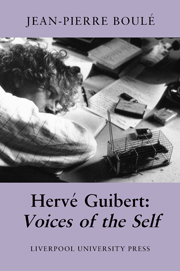Book contents
- Frontmatter
- Contents
- Acknowledgements
- List of Abbreviations
- Introduction
- 1 Youthful Writings
- 2 Photographic Writing
- 3 Towards the Novel
- 4 Image and Text
- 5 The ‘Novel’
- 6 ‘Autobiography’
- 7 Towards the roman faux
- 8 The roman faux
- 9 Thanatographical Writing
- 10 The Fictitious, the Fake or the Delirious
- Conclusion
- Notes
- Bibliography
- Index of Names
- Index of Notes
9 - Thanatographical Writing
- Frontmatter
- Contents
- Acknowledgements
- List of Abbreviations
- Introduction
- 1 Youthful Writings
- 2 Photographic Writing
- 3 Towards the Novel
- 4 Image and Text
- 5 The ‘Novel’
- 6 ‘Autobiography’
- 7 Towards the roman faux
- 8 The roman faux
- 9 Thanatographical Writing
- 10 The Fictitious, the Fake or the Delirious
- Conclusion
- Notes
- Bibliography
- Index of Names
- Index of Notes
Summary
A year-and-a-half elapsed between À l'ami and Le Protocole compassionnel. It is known from the ‘Ex-Libris’ broadcast that during this period Guibert was very poorly and that he did not write for a year. His survival he then will attribute in part to his readers, who had started writing to him. As the narrator of Le Protocole compassionnel tells us, the readers rallied round after he appeared on ‘Apostrophes’ to ‘[le] maintenir en vie’ (‘keep him alive’) in their own way. On ‘Ex-Libris’ Guibert will say that these letters helped him to keep going for a year without writing. A text signed ‘H.G.’ on the back cover of Le Protocole compassionnel informs us that this period was ‘le temps de la renonciation à l'écriture’ (‘the time of the renunciation of writing’). There were three reasons behind this renunciation: the first was Guibert's state of physical deterioration; the second was the reason mentioned in the conclusion to the previous chapter, that Guibert had sworn not to write another book about AIDS; and the third was the success of Á l'ami and the attendant large sales which paralysed the writer (‘Aprés ce livre-là et son accueil, je ne pouvais pas écrire une pochade, je me sentais une responsabilité par rapport à ces inconnu(e)s que j'avais ému(e)s’, PC, p. 171) (‘After that book and its reception, I could not write a sketch, I felt a sense of responsibility towards those unknown men and women whom I had moved’).
- Type
- Chapter
- Information
- Hervé GuibertVoices of the Self, pp. 207 - 234Publisher: Liverpool University PressPrint publication year: 1999

